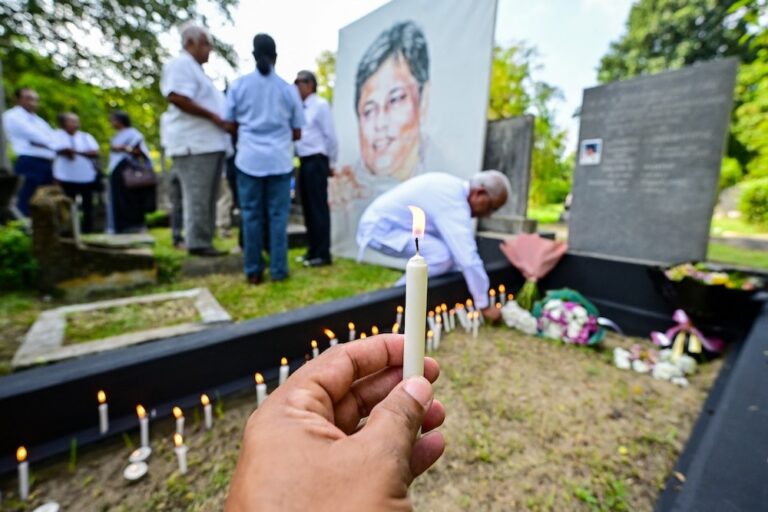(IFJ/IFEX) – The following is a 9 March 2007 IFJ media release: IFJ says new report highlights dire situation for Sri Lankan media The International Federation of Journalists (IFJ) has called for action in response to the terrible press freedom and journalist safety situation in Sri Lanka, after the release of the final report of […]
(IFJ/IFEX) – The following is a 9 March 2007 IFJ media release:
IFJ says new report highlights dire situation for Sri Lankan media
The International Federation of Journalists (IFJ) has called for action in response to the terrible press freedom and journalist safety situation in Sri Lanka, after the release of the final report of the International Press Freedom and Freedom of Expression Mission to Sri Lanka. The mission involved members of leading international human rights and press freedom organisations, including the IFJ, and visited Sri Lanka from October 9-11, 2006.
The organisations who supported the Mission were: ARTICLE 19, Committee to Protect Journalists (CPJ); FreeVoice; International Federation of Journalists (IFJ); International Freedom of Expression Exchange (IFEX); International Media Support (IMS); International Press Institute (IPI); International News Safety Institute (INSI); Reporters Without Borders (RSF); South Asia Press Commission (SAPC); United Nations Educational, Scientific and Cultural Organisation (UNESCO); World Association of Community Radio Broadcasters (AMARC); World Association of Newspapers (WAN); and World Press Freedom Committee (WPFC).
IFJ President Christopher Warren said the report, “Press Freedom and Freedom of Expression in Sri Lanka: The Struggle for Survival”, highlights the dire situation the Sri Lankan media face.
“The report shows that the situation for media workers in Sri Lanka is continuing to deteriorate,” Warren said.
“Nine media workers have been killed in Sri Lanka since August 2005, and there have been numerous incidents of death threats, harassment and attacks,” he said.
Released in Colombo, Sri Lanka, on March 7, the mission’s report also found that, in many such cases, the authorities took little or no action to prosecute or condemn those responsible.
The mission reported that the escalation in fighting between the Sri Lankan Government and the Liberation Tigers of Tamil Eelam (LTTE) has led to repression of the media, and has restricted the free flow of information through the country.
“This leaves communities at the mercy of rumour and inaccurate information, which only serves to worsen the instability and hostility they face,” Warren said.
“Not only do Sri Lanka’s media workers deserve a safe working environment, but the people of Sri Lanka have the right to expect accurate information and clear channels of communication.”
“With the Sri Lankan Government hampering public access to foreign news and programming, and still yet to enact a freedom of information act, it is clear Sri Lanka’s freedom of expression is compromised.”
The full report can be downloaded from the reports section of the Free Media Movement website: http://www.freemediasrilanka.org
The IFJ represents over 500,000 journalists in more than 115 countries.


